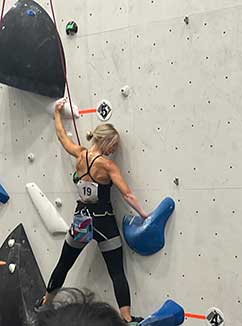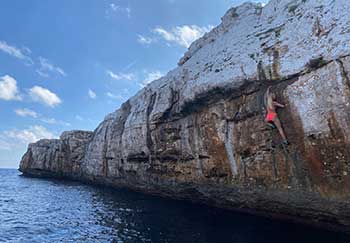Surgeons were unable to save her hand. They gave her so much more.
by 184yw8rhwhr

In 2017, Charlottesville local Allie Redshaw had a freak accident that resulted in her right hand being amputated. Bobby Chhabra, MD, director of the UVA Health Orthopedic Center, performed the emergency surgery.
When I sat down with Allie, I was ready for a story of loss. Instead, I found myself deeply moved by the human capacity to discover wonder and create connections from devastating circumstances.
Allie tells her story.
The accident
I am a formally trained chef. I went to the Culinary Institute of America in Hyde Park, New York. It is a formal education in all things hospitality and cooking, including the use of large industrial machinery.
March 1stst2017, I worked early in the morning at Lampo. I was there with 2 work colleagues. We always arrived at the same time and did more or less the same activities every day.
My husband Ian and I had just found out we were pregnant with Willow. I had just taken a pregnancy test maybe 5 or 6 days before. We were very early in the pregnancy. Our other daughter was about 18 months old.
That day my glove ended up in the meat grinder auger.
Survival instincts
There was so much echo of people saying, ‘Wow, you’re so inspiring; you’ve overcome so much!’ There wasn’t a lot of time to sit with what happened. It wasn’t great. It really hurt. I never realized how much it hurt.
I don’t know how I could be verbal.
My phone was blocked. It had a keypad that asked for my face or a code, so I had to tell my coworkers the code on my cell phone so they could call Ian and tell him I was hurt. And I was able to let the paramedics know that I was pregnant.
I think it’s just one of those crazy instinctive Mother Nature things. All your instincts, all the care and nourishment you’ve put into your body for this kind of moment, it all kicks in.
It happens so fast. You don’t really sit back and think about how you managed to survive. It was crazy and amazing.
Paramedics could have attempted to remove the mole on the spot. The risks were blood loss, or hitting something in my body that was really important, or just not being able to get to the hospital in time. Instead, they contacted the hospital and connected with someone in pediatrics in the emergency room to talk about what they could give me and what they couldn’t give me so the baby would be safe.
I remember being on the stretcher with the grinder on my lap. They put a sheet over the grinder because at first the grinder was still on my arm and there were pieces of my finger and arm on the floor. And of course blood was everywhere.
There were a lot of trucks and a lot of sirens. I remember walking out the front door and that was the last thing I really remember until triage.
Waking up to a new reality
I remember waking up during recovery and my husband being there. First he let me know that Willow was okay. That was the first thing he said to me and the first thing I asked him. And then he let me know that my hand had been amputated.
I remember saying, “Why?” I had so many questions.
For both Dr. Chhabra and Ian, there were many difficult choices to make when I was unable to make them myself.
The decision to completely amputate was difficult. I was right-handed. There were remaining parts of my hand that had a little bit of pinky and a little bit of flesh. They had to think about my future and the use of a prosthesis. If I wanted to get back into the kitchen again, what would be my most efficient option?
Dr. Chhabra, during the surgery, reset the nerves in my arm, so that there was no cutting of nerves which was not necessary. This prevented a lot of phantom limb pain. Because of the way he managed the remaining nerves and the nerve block catheter they inserted into my shoulder, I live without any nerve pain or discomfort most of the time. This is absolutely huge. For most amputees I’ve met, this is an important part of their journey: dealing with those pains that come unexpectedly.
So I consider myself very, very, very fortunate that Dr. Chabra was as diligent as he was, and that his care team was as diligent as they were.
To Dr. Chhabra I owe everything in the world. I think he is the most amazing surgeon and person. He made all the choices he made to keep me and Willow as safe and functional as possible.
Recovery and discovery: post-amputation therapy
After I was released from the hospital, health workers came to the house and constantly made sure the bandages were changed, checked the nerve block, and took my weight to make sure Willow was okay. Lots of nourishment.
I did physical therapy (PT) through UVA Health. They were wonderful, absolutely wonderful. I’ve had really great therapy experiences, PT and occupational therapy. I did a lot of desensitization exercises. They are very physically demanding, but also very emotionally stimulating, as they tune the nerves and skin to sensations never felt before.
You don’t think about it, how things will feel on the tip of your forearm or your wrist, but the skin there is really different. Your hands have calluses, accumulated over the years.
They would have a little warm wax thing and I would very gently get my skin used to going into the warm sensation. Then it was like putting my arm in a bucket of dry rice, getting used to the stinging sensation.
I also did a lot of mirror therapy, which stimulates the different parts of the brain where you sense your abilities and sensations and what’s there and what’s not.
We welcome Salice
For most of my pregnancy I was very depressed. I felt like my career had really been taken away. I’m a very active being, physically, and everything stopped. That was a big part of my mental health: my mind was still active and I had all these things to worry about all the time and I couldn’t get them out.
I wasn’t sure how I would ever get over it. I couldn’t really see the way forward.
And then Willow was born and, of course, it was a great joy and celebration. And it felt like we had overcome a really huge obstacle: knowing that Willow was safe, and it was only my body I was worried about now. I could start moving again. I might start staying out. I might start pushing myself more.
I began to see a little more light in the sky every day.
Life after birth
I was recommended to check out this rock climbing clinic for amputees in Colorado. And that was it for me: meeting other amputees, seeing other people who had been through this since birth, amputees who had served in the military and had had horrible accidents. Some of them had been living with post-traumatic stress disorder for years and years.
It was just this new world for me. I was able to ask questions like, “I know this is really stupid, but how do you hold your fork?” or “how do you button your pants?” or “how do you tie your shoes?” I felt like a child, learning everything all over again.

And it was incredible. Watching legless friends tied in a harness and using only their arms to reach the top – it was truly a mind-blowing experience. I learned so much. I have gained so much perspective. I felt so honored, happy and grateful to be there.
The woman who hosted that clinic, Kirsty Ennis, is now one of my best friends and mentors. He lost his left leg in a helicopter crash. She founded her own nonprofit, the Kristie Ennis Foundation, and is a force to be reckoned with.
Or there’s Molly, whose daughter was born with a limb difference. He needed community, so he started an organization that hosts a weekend festival every year, Lucky Fin. It became a huge sensation. There are famous athletes, musicians, actresses, people with different bionic arms, all princesses with different bionic bits. It’s a whole other world and it’s so beautiful. I feel like I’m taking a deep dive into this huge wave.
Many in the disability community are doing this now, creating space for those who are new to the community. You feel so isolated and alone, and then you’re just enveloped in this knowledge and wisdom and welcome, like, “Hey, we know this is all new, but guess what, we’re going to go through this together. And if you have any questions, you can call, and if you need a part for your denture, here’s who to call.” There’s just this huge web of inclusion and acts of selflessness. I wouldn’t be anywhere without the community.

Climb with gratitude
I obtained my yoga teacher certification. It has simply been a gift to my mind, body and mental health, once again, challenging me with new ways of movement, ways I can adapt and make it my own. I’m actually starting a non-profit with 2 other congenital amputees living in different corners of the world. It’s called Adapting Together, and last year we hosted our first adaptive yoga retreat for women with limb differences, and we did it here in Virginia. This year we will be hosting a New Year’s Eve adaptive yoga retreat for women with limb differences in California.
I’m a mountain climber, I do yoga and I’m on the competitive climbing circuit. Twice I did deep water soloing, which is a form of rock climbing where you’re outdoors, on the water, without a rope.
Climb as high as you can and then fall into the water.
And every time I see Dr. Chhabra, I end up in tears. I just can’t believe how something so tragic can pave the way for something so beautiful with so many adventures, so many learning and teaching moments.
Agen Togel Terpercaya
Bandar Togel
Sabung Ayam Online
Berita Terkini
Artikel Terbaru
Berita Terbaru
Penerbangan
Berita Politik
Berita Politik
Software
Software Download
Download Aplikasi
Berita Terkini
News
Jasa PBN
Jasa Artikel
In 2017, Charlottesville local Allie Redshaw had a freak accident that resulted in her right hand being amputated. Bobby Chhabra, MD, director of the UVA Health Orthopedic Center, performed the emergency surgery. When I sat down with Allie, I was ready for a story of loss. Instead, I found myself deeply moved by the human…
Recent Comments
Categories
Surya777